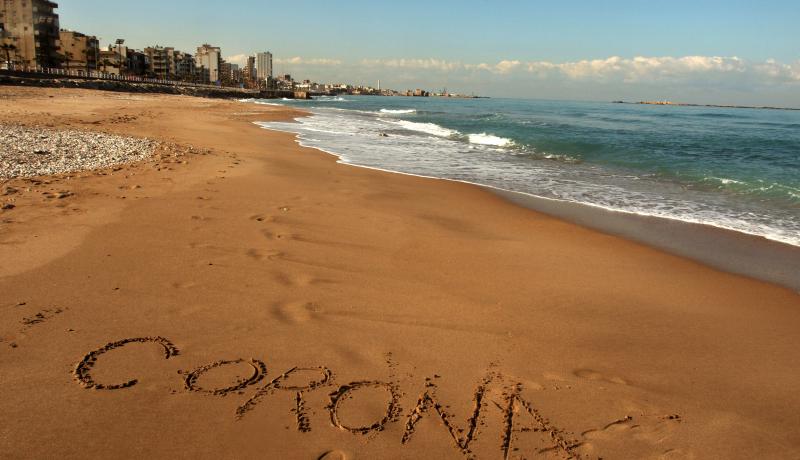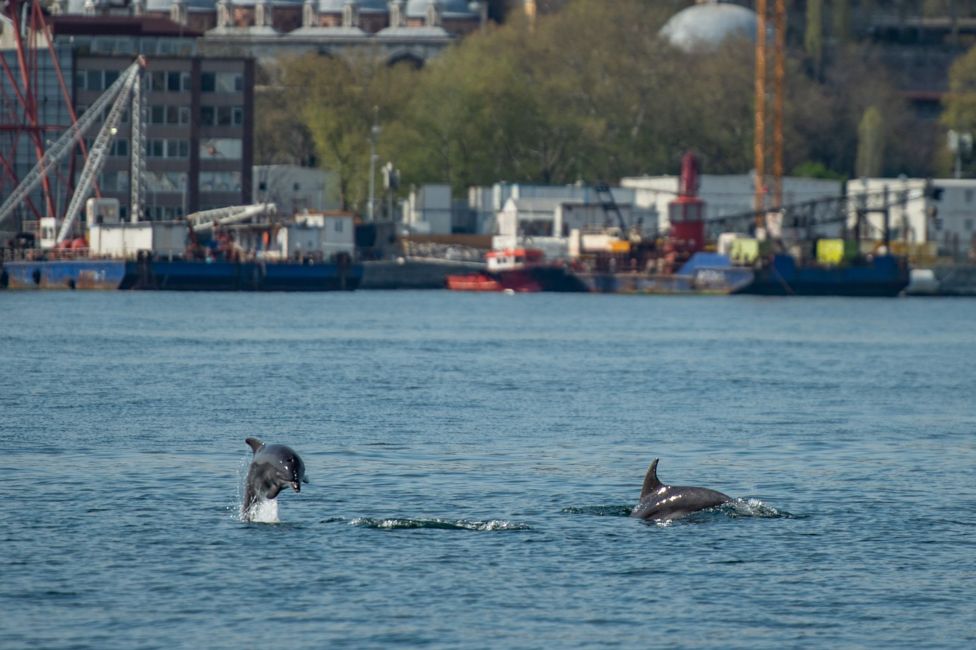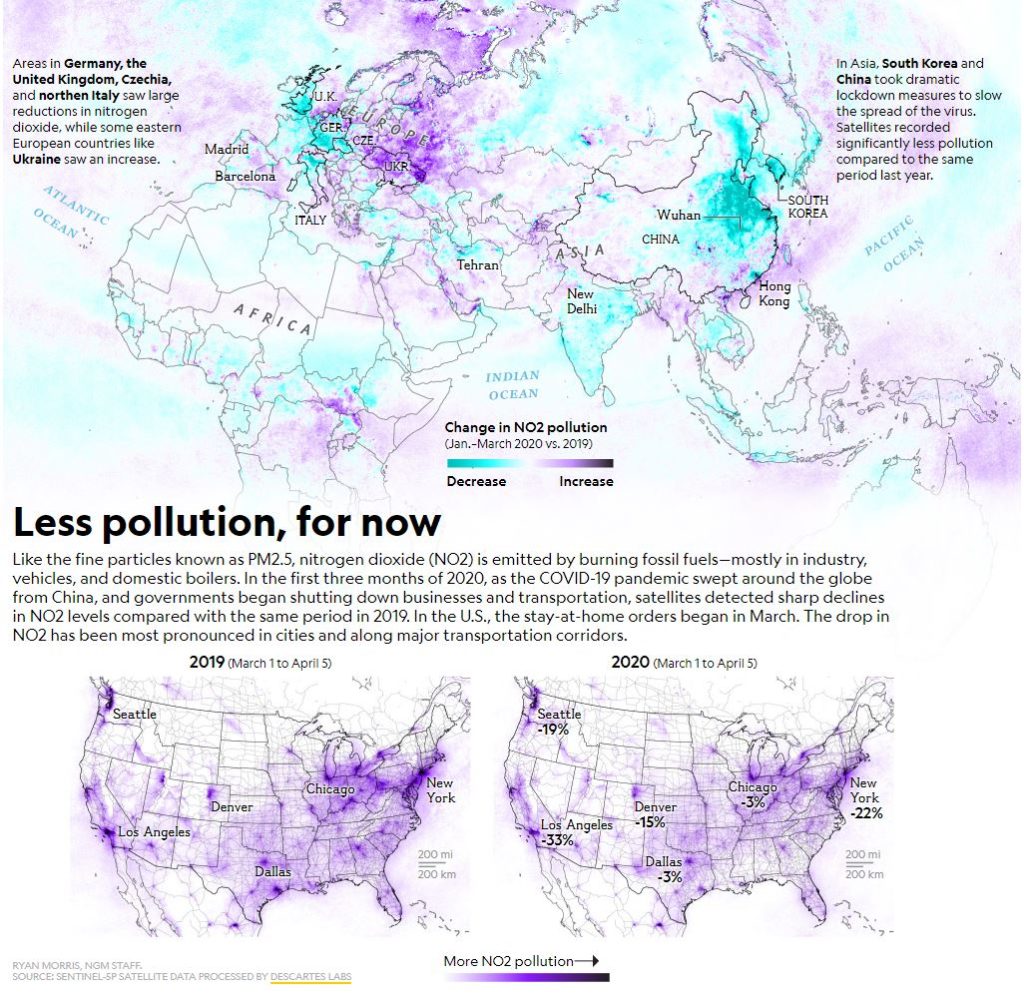The global shutdown due to COVID-19 has drastically changed people’s lives, from the little stuff to the big.
Human activity such as regular flying and development has caused drastic and destructive climate change, however, the world has suddenly stood still causing environmental impacts both good and bad.
This pause has allowed the environment to take a breather.
This statement is in no way painting the tragedy of the global crisis of COVID-19 in a positive way, it does, however, highlight the change that could be made for a more sustainable future based on the episodic change currently occurring.
Photo by Mahmoud Zayyat/AFP via Getty Images

‘The outbreak of epidemics like COVID-19 reveal the fundamental tenets of the trade-off we consistently face: humans have unlimited needs, but the planet has limited capacity to satisfy them.’ – Pushpam Kumar, United Nations Environment Programme, Chief Environmental Economist (UN Environment Programme, 2020)
Here are the environmental impacts that have been reported since global COVID-19 lockdowns.
Air pollution has reduced
Air pollution is a significant contributor to a range of human health issues and contributes to around 7 million deaths globally every year according to the World Health Organisation.
Nearly all of the world’s populations breathe in poor air quality. This is mainly caused as a by-product of modern human activity, such as transport, energy, waste and industry. Across the world, cities have seen a reduction in air pollution and improvement in air quality due to restrictions on movement.
China reported that data indicated an 84.5 percent increase in days with good air quality between January and March 2020, which has been suggested to have prevented 50,000 to 75,000 people dying. Further research from IQAir has reported that deadly air pollution in 10 cities (including New Delhi, Seoul, Mumbai) has reduced by up to 60 percent during lockdown. Paradoxically, research also shows that 80 percent of COVID-19 deaths in four cities were in the most air polluted areas, indicating that air pollution may worsen the illness.

Via BBC: Residents of Istanbul say dolphins are coming further up the Bosphorus than usual
Wildlife has been given a chance
From the devastating bushfires Australia saw over the summer, in which at least 20 species were pushed closer to extinction, it is beautiful to now see photos of animals flourishing in some areas.
It would make sense that areas that are normally congested full of tourists and pollution are now quieter for wildlife to explore. There’s been no conclusive evidence that there’s been a drastic change, however, isolated examples have been shown such as vulnerable leatherback and loggerhead sea turtles have been flourishing in Florida. There have been some viral images of animals that have been fake, however (such as the dolphins in Venice).
It is also interesting to note that the blurring of boundaries between humans and animals is a significant cause of new infectious pathogens (zoonotic diseases).
This has meant that COVID-19 has pushed temporary and potentially long-term bans on live wildlife markets, such as the sale of live wolf pups. China has issued a temporary ban on this, however, the United Nations have called for this to be long-term globally, not only for the benefit of animal rights but human population health.

Via National Geographic
Global greenhouse gas (GHG) emissions have reduced
For the world to survive and reduce global warming to the United Nations’ Paris Agreement limit of 1.5 degrees Celsius, global greenhouse gas emissions need to drastically reduce.
The International Energy Association has reported that the world is on track this year for an 8 percent reduction in GHG emissions, which is in line with the Paris Agreement. The current global lockdowns however would need to continue, which is exceptionally unlikely and unsustainable.
When ‘normal’ life returns, GHG emissions may even be worse than before and sharply increase. It again raises the importance for governments to implement drastic long-term policies, commitment and innovation to work towards net-zero GHG emissions.
This includes investment into sustainable, clean and resilient energy systems, which will provide security during turbulent times such as pandemics. Another aspect which may boost economies, is training workers from carbon-intensive industries into renewable energy industries.
Is it all positive for the environment?
The positives to the world standing still from the global COVID-19 pandemic is not all positive for the environment.
Understandably, plastic waste has increased during COVID-19 due to the ability to use it for single-use (in theory reducing the spread of virus infection). Plastic bag restrictions such as bans, that took years to implement, have been relaxed during COVID-19 times.
For example, in New Hampshire in America, shoppers were banned from bringing reusable bags. In Australia, some cafes including large retailers like Starbucks, banned the use of reusable cups, the idea being that single-use is more hygienic. Medical plastic waste has also drastically increased, from single-use face masks to gloves.
There are also reports of recycling facilities shutting up and informal waste pickers stopping. There is no indication of the long-term fall out on this, however it may significantly slow or even reverse efforts to reduce plastic waste.
What’s next?
With the good and the bad, these environmental impacts highlight the ability for humanity to adapt quickly and adopt change. This resilience and innovation need to be adopted ongoing. The way we currently live both in and out of COVID-19 is not sustainable, yet the way we move forward is crucial for humanity and the environment.


